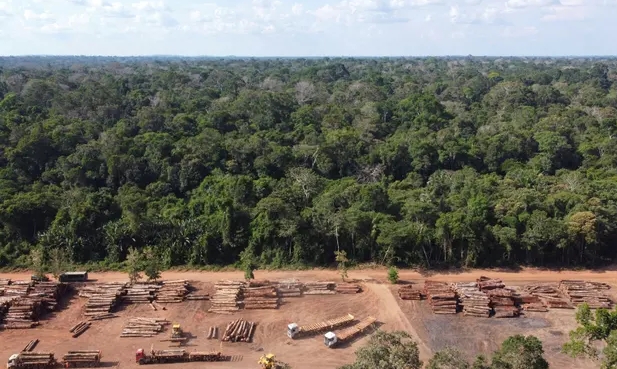More than 100 leaders pledge to stop and reverse deforestation and land degradation by 2030, The Guardian reports
Preserving the world’s forests will be one of the cornerstone achievements of the Cop26 climate summit, with some of the biggest forest nations and consumers of forest products signing an “unprecedented” deal to save forests, according to UK Environment Secretary Zac Goldsmith.
On Tuesday, more than 100 world leaders will pledge to stop and reverse deforestation and land degradation by 2030, backed by nearly 14 billion pounds of public and private funding. Major producers and consumers of deforestation-related products, including Indonesia, China, Brazil and the United States, have pledged their names to the deal, which aims to reduce the second-largest source of greenhouse gas emissions.
Lord Goldsmith told the Guardian, “It really is an unprecedented package. People will be able to justify the hope [of saving the world’s forests]. It puts us on the road to recovery and renewal.”
He said it was “not easy” to convince many of the countries involved to join because the deal requires not just a commitment to stop logging – which has never happened before, despite numerous failed attempts – and to give forest countries the means to replace the money they could get from exploiting forest land, but also to reform aspects of product markets so that buyers cannot avoid importing goods produced on deforested land.
“The different parts of the package reinforce each other,” Goldsmith said. “We’re sending a very strong message to the markets; we have a good bailout from buyers. The market is overlooking the value of the environment … The [current economic] incentives for logging are 40 times greater than the incentives for keeping forests healthy, so it’s hard to change that.”
The list of countries includes China and Brazil, as well as small developing countries and a few big buyers of forest products that will clear their supply chains.
“There are some amazing countries out there, and that’s a pretty optimistic promise,” the conservative expert said, though he declined to name any countries. “We’ve been able to convince some of the trickier customers to join us.”
Goldsmith, son of the late billionaire financier Sir James Goldsmith, was a longtime prominent environmentalist, former owner of Ecologist magazine, campaigner and philanthropist for environmental projects. His political career as an MP, which included campaigning against Sadiq Khan’s Labor Party for mayor of London, which was marred by allegations of Islamophobia, ended in defeat in the 2019 election. Shortly thereafter he was placed in the Lords, controversially, by Boris Johnson. He was accused by Johnson, an old friend and old comrade from Eaton, of what he said was a personal passion for protecting nature and combating the loss of species and habitats.
“Putting nature at the forefront [of policing] was an obsession of mine. It’s crazy that nature has always been more or less forgotten [in climate negotiations],” Goldsmith said.
The difficulty of reaching the broader deal hoped for at Cop26, of drastically reducing greenhouse gas emissions in line with scientific advice, became clear on the first day of the summit, when more than 120 world leaders gathered in Glasgow. UN Secretary-General António Guterres grimly predicted the prospects. “Recent announcements of action on climate change may give the impression that we are on a path to make a difference,” he said. “That’s an illusion.”
In that context, having a forestry spin-off is a major boost for the U.K. as a host country. Still, some countries and analysts told the Guardian that the agreement, while important, was flawed and lacking in some key aspects: too little money was allocated to help poor countries preserve their forests, and too little attention was paid to reducing demand for commodities like soybeans, palm oil and beef, which contribute to deforestation in the first place.
John Soven, executive director of Greenpeace, said: “Everyone wants zero deforestation, not least the indigenous peoples whose homes and livelihoods are threatened. But without fighting the drivers of destruction, to think that cash alone will work is like whistling in the wind. Cattle and soybeans for animal feed are destroying the Amazon and the savannahs of Brazil. The industrial meat industry, like its fossil fuel counterpart, needs to end.”
He added: “All the climate scientists say we need to eat less meat. We won’t save the forests until politicians stop ignoring this message.
Indigenous leaders, who several studies have shown are the best stewards of the natural world, also said they were not consulted about the declaration, adding that many of the leaders who made the pledge have repeatedly broken promises to protect indigenous rights.
Goldsmith said the deal would benefit forest dwellers. “Indigenous people have always been seen as second-best [in the police], they’ve never had this kind of support before,” he said. “I think this support will be a game changer for them in this policing.”
He added: “If you put it together, it’s a solid package that’s trying to bring as many of the big countries together to commit to ending deforestation. But it’s worthless if they don’t back it up with policy. It’s our job to make it a reality.”

